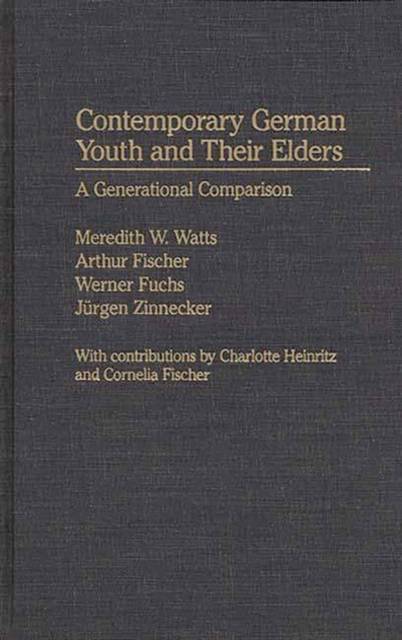
- Afhalen na 1 uur in een winkel met voorraad
- Gratis thuislevering in België vanaf € 30
- Ruim aanbod met 7 miljoen producten
- Afhalen na 1 uur in een winkel met voorraad
- Gratis thuislevering in België vanaf € 30
- Ruim aanbod met 7 miljoen producten
Zoeken
Contemporary German Youth and Their Elders
A Generational Comparison
Meredith W Watts, Arthur Fischer, Werner Fuchs
€ 161,45
+ 322 punten
Omschrijving
Systematic research on the changing experience and social and political characteristics of German youth has been carried out in the Federal Republic of Germany on an ongoing basis since the early 1950s. Until now, however, the results of these long-term studies have not been made available in English. Six volumes of this research--including new analyses prepared especially for this book--are distilled in the present work, which offers a comprehensive and focused portrait of German youth of succeeding postwar generations from 1953 to the present.
Following an introductory survey of the scope and themes addressed in the study, the authors highlight the contrasting experiences of youth of the 1980s and those who came of age soon after the end of World War II. They examine the fundamental constituents of youth as a developmental period, with particular reference to changes in the recent era. Attitudinal scales are developed and applied to assessments of variations in social and political orientation among generations and between distinct subgroups of contemporary youth. Differences between young women in the early postwar period and the alternative era of the 1970s and 1980s are explored. Focusing on views of the future, the final chapter looks at the diversity of lifestyles that has become characteristic of youth over the last decade and at the increasing differentiation between generations. Providng a wealth of new material on an important body of research, this book makes a substantial contribution to the study of youth in advanced industrialized nations. An appropriate resource for courses or studies in various disciplines in sociology, geography, political science, and social history.Specificaties
Betrokkenen
- Auteur(s):
- Uitgeverij:
Inhoud
- Aantal bladzijden:
- 208
- Taal:
- Engels
- Reeks:
- Reeksnummer:
- nr. 5
Eigenschappen
- Productcode (EAN):
- 9780313267413
- Verschijningsdatum:
- 7/08/1989
- Uitvoering:
- Hardcover
- Formaat:
- Genaaid
- Afmetingen:
- 152 mm x 229 mm
- Gewicht:
- 489 g

Alleen bij Standaard Boekhandel
+ 322 punten op je klantenkaart van Standaard Boekhandel
Beoordelingen
We publiceren alleen reviews die voldoen aan de voorwaarden voor reviews. Bekijk onze voorwaarden voor reviews.











